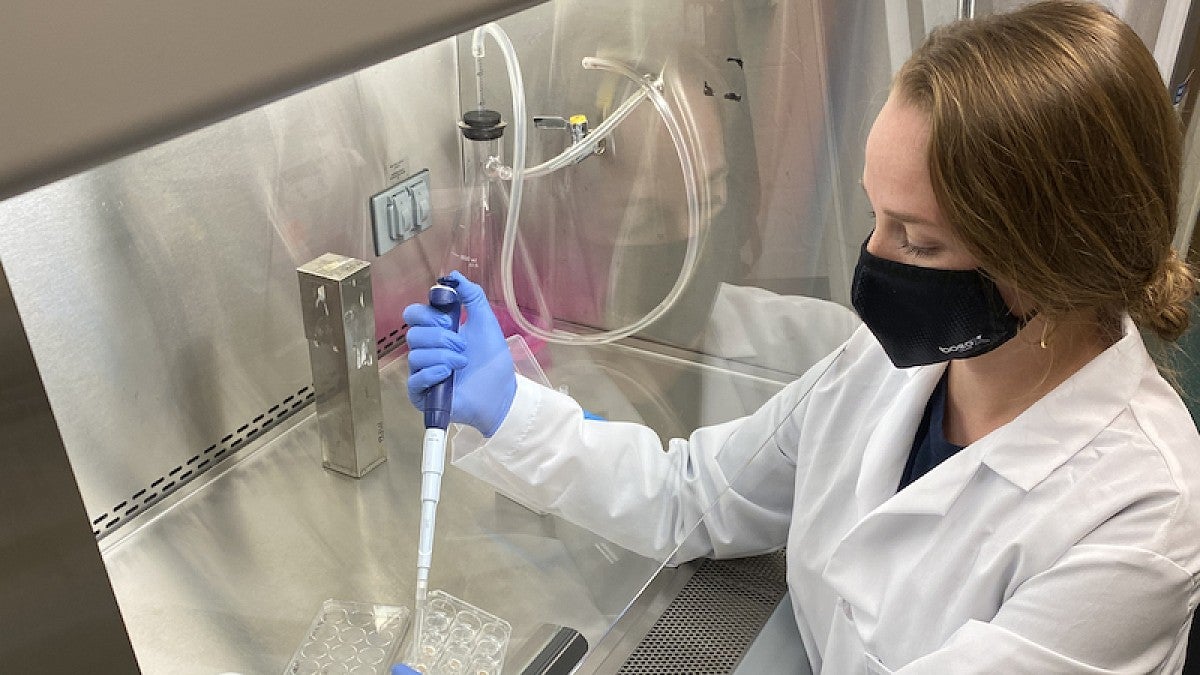Studying “the fungus among us” — resident fungi on our bodies, such as yeast — and how they affect our microbiome or even fight off pathogens is a line of research that recently won a University of Oregon biology researcher a major fellowship.
Caitlin Kowalski is a postdoctoral fellow in the UO’s Barber Lab, led by biology professor Matt Barber, which investigates the evolution of host-microbe interactions. Her award from the Helen Hay Whitney Foundation is the first of its kind to a UO researcher, according to university records, and will fund her research around yeast-bacteria interactions for the next three years, beginning in April.
Established in 1947, the Helen Hay Whitney Foundation awards about two dozen fellowships annually to promising young researchers in biomedical science. The funding provides a stipend of $177,000 over three years, plus an annual $1,500 research allowance.
As the principal investigator, Kowalski gets more freedom to pursue various angles of her research interests than she might through narrower, annual grant funding awarded to the lab.
When Kowalski joined the Barber Lab a year and a half ago, she brought with her an interest in fungal pathology from her doctoral work at Dartmouth College. At the UO, she wanted to study Malassezia, a common kind of yeast regarded as a “good bug.” Because research tends to focus on pathogenic “bad bugs,” microbes like Malassezia are under-studied.
“I saw this nice niche where I could apply my fungal biology expertise to see how this yeast affects surrounding bacteria on the skin, as well as bacteria that aren't normally on our skin but cause disease when they get there,” she said.
Humans coexist with dozens of strains of yeast on skin, in the air and in the environment. Though yeast can trigger an immune response in a small percentage of people, most tolerate yeast in their microbiome, the community of microorganisms all humans play host to, just fine. Kowalski’s research looks beyond the detrimental and neutral relationships of humans and yeast to study the instances in which those yeast can actually protect us.
Kowalski’s work examines how these yeasts interact with Staphylococcus aureus, a common skin bacterium that can become dangerous when it infects the body’s inner systems. Known as a “superbug,” Staph aureus is resistant to many antibiotics.
Kowalski is now progressing on a couple research paths, including looking at how the bacteria may be evolving in the presence of the yeast. With the fellowship’s support, she hopes to broaden similar experiments to other types of benign fungi to discover how they may be modulating pathogens in the microbiome.
Barber, Kowalski’s mentor and an assistant professor at the UO’s Institute of Ecology and Evolution, sees the project as a natural trajectory of both his lab’s focus and Kowalski’s past work that could lead her to having her own research lab in the near future.
“Nobody’s really working in this area at the moment,” Barber said. “It’s gratifying to know that people on the committee were as excited about the work as she and I are.”
The indirect benefits of Kowalski’s fellowship extend throughout the Barber Lab, from an undergraduate student who Kowalski is mentoring to the other lab members, both by encouraging them in their research and freeing up resources for other projects.
The award is huge financial support for Kowalski, but she said the prestige of the organization and the network of researchers she gains through it are just as meaningful. The foundation’s annual meeting convenes new and current fellows with its scientific advisory committee, which includes some of the biggest names in the fields of biomedical research in a setting where all the fellows can share ideas and learn from one another.
Kowalski encouraged all would-be fellows to go through the application process, because regardless of the outcome, it had its own benefits for her.
“When you see the odds of getting the fellowship, you can be kind of disenchanted by that, but it's never not worth the effort to try,” Kowalski said. “Because even if I didn't get awarded the fellowship, thinking about how I wrote the proposal, I got new ideas just from the process of doing it and talking to other current fellows I connected with virtually. I gained so much just in writing it.”
—By Anna Glavash Miller, College of Arts and Sciences


